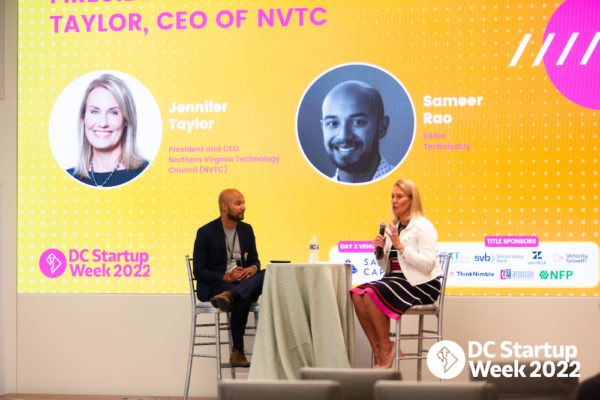One of the best parts about being a journalist — especially one as new to a subject area as I am to tech — is the near-omnipresent opportunity to ask impactful leaders really basic questions. But I typically don’t take such an opportunity in front of a live audience.
The chance to both step outside my comfort zone and have a conversation that illuminates a rapidly changing and bustling tech market ultimately pushed me to accept the offer of a half-hour fireside chat (though not technically in front of an open flame — that would be extremely dangerous) with Northern Virginia Technology Council (NVTC) CEO and President Jennifer Taylor. We spoke about two weeks ago, at the Arlington, Virginia headquarters of global investment management firm Sands Capital, during programming for the second day of DC Startup Week 2022.
The invitation from DC Startup Week organizers (with whom Technical.ly has worked as the annual event’s media partners) arrived as they were finalizing the conference’s first in-person iteration since the COVID-19 pandemic began. During those intervening years, global market strength led to the DMV boasting a record-breaking, near-$5 billion VC year in 2021. Naturally, that success has some observers worrying about the market correction that may have already arrived in the form of a recession.
While we didn’t get time to talk about the recession fears (a half hour goes very fast), Taylor shared only optimistic predictions about the local tech and startup ecosystem’s future. Perhaps that’s to be expected of someone who leads one of the country’s largest regional councils and coordinates resources, offers networking opportunities and advocates in public policy contexts for approximately 450 member companies.
But that optimism was evident throughout our conversation, which touched on her own professional journey, the remote work evolution, where the DMV tech scene will be in a decade and why equity and representation are crucial to it all.
Here are just a handful of key insights and predictions that all DC-area tech companies could stand to note:
Modernization via automation
Taylor said that one of the biggest challenges she undertook when she started in her NVTC position nearly two years ago was to modernize its internal tech and management systems. While time prevented her from getting into the nitty-gritty details of what this looked like, she said that it inevitably involved automating certain functions.
“My middle name is automation,” she said. “I’ve told the team: If something you’re doing can be done by a computer so that it frees up your time, so you’re not doing the mundane work… so you can do the more creative things, and grow and expand the business — and be more member-centric and serve our members, because they’re our constituents — [then do that]. So that was the first thing I dealt with, and after two years, I can honestly say I’m seeing the fruits of that transition.”
She later added that she saw automation as a major force in the regional ecosystem’s future.
The tech scene’s future will be more education-inclusive
Asked where she saw the DMV tech ecosystem a decade down the line, Taylor drew from her prior experiences — not just in her current job, but also in positions like the VP role she had with the Arlington-based Consumer Technology Association — to predict that the tech scene will embrace equity principles better than it has before. Part of that involves finding newer and better ways than four-year degree completion to gauge baseline experience.
“We’re going to see companies investing in our workforce in new and different ways,” she said. “The four-year college degree is not affordable for everyone and is not the only pathway to skilled jobs, so, you’re going to see a rise in what I call ‘new collar’ apprenticeships for IT-related roles.”
After briefly mentioning her work with IBM on that “new collar” model, Taylor added: “You’re going to see more collaboration with companies and community colleges and universities, but also work-based learning providers, and there are many in our area.”
DEI matters — and not just within companies
Taylor emphasized that employers and states which create open and inclusive business environments will thrive better than those that don’t.
“You’re going to see an increased diversification of our workforce — more inclusivity, more companies creating a sense of belonging,” she said. “Also the states and the regions that are going to thrive and win are the ones that are going to create a sense of belonging and welcomingness. The states that don’t do that will wither and fall behind.”
This future progress will inevitably dovetail with increased strain on what is already a prohibitively expensive area, including once Amazon’s H2Q opens for business in Northern Virginia. Asked if regional companies of any size can do more to make the DMV an easier place to live for all, Taylor said that these entities must “be intentional.”
“Take a look at your workforce and your ecosystem. Is it diverse? Is it not?” she said. “Also communicate what your commitment statement is. The companies who are communicating it, and then infusing it in their day-to-day- work language are going to be the ones that are going to succeed.”
Join the conversation!
Find news, events, jobs and people who share your interests on Technical.ly's open community Slack

DC daily roundup: Washington Post's AI collab; a greentech glossary; Halcyon's debut Climate Fellowship cohort

DC daily roundup: Inside UMCP's new ethical AI project; HBCU founder excellence; a big VC shutters MoCo office

DC daily roundup: Esports at Maryland rec center; High schoolers' brain algorithm; Power data centers with coal?


